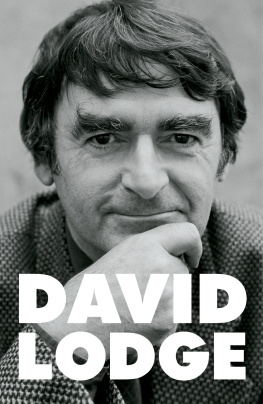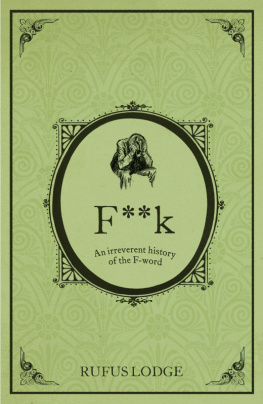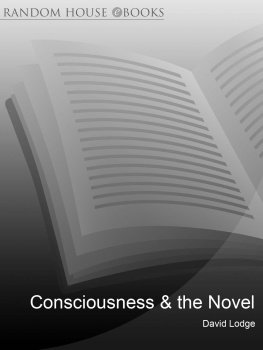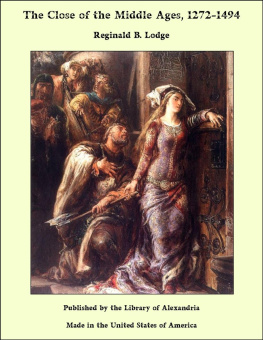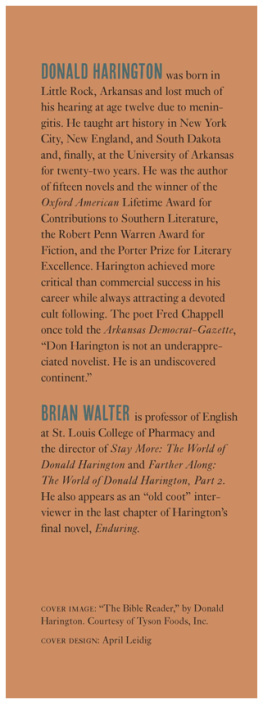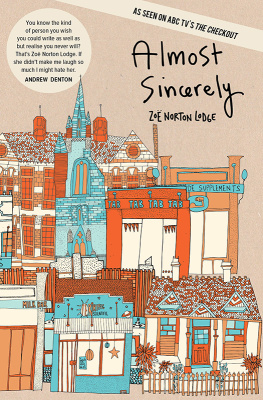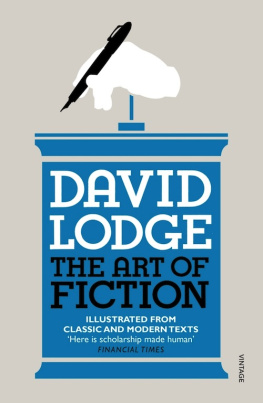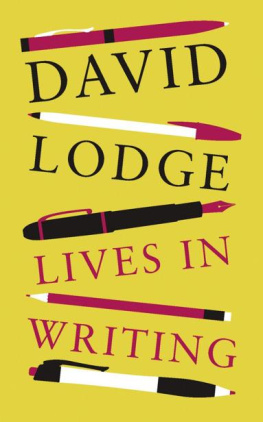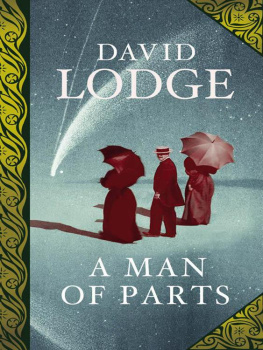CONTENTS
ABOUT THE AUTHOR
David Lodge (CBE)s novels include Changing Places, Small World and Nice Work (shortlisted for the Booker) and, most recently, A Man of Parts. He has also written plays and screenplays, and several books of literary criticism. His works have been translated into more than thirty languages.
He is Emeritus Professor of English Literature at Birmingham, a Fellow of the Royal Society of Literature, and is a Chevalier de lOrdre des Arts et des Lettres.
ABOUT THE BOOK
David Lodges frank and illuminating memoir about the years where he found great success as a novelist and critic.
Luck plays an important part in the careers of writers. In this book David Lodge explores how his work was inspired and affected by unpredictable events in his life.
In 1976 Lodge was pursuing a twin-track career as novelist and academic. As a literary critic, he made serious contributions to the subject, before carnivalising it in his comic-satiric novel Small World. The balancing act between his two professions was increasingly difficult to maintain, and he became a full-time writer just before he published his bestselling novel Nice Work. Both books were shortlisted for the Booker Prize, in which he was later involved as Chairman of the judges.
Readers of Lodges novels will be fascinated by the insights this book gives not only into his professional career but also more personal experience. The main focus, however, is on writing as a vocation. Anyone who is interested in learning about the creative process, about the dual nature of the novel as both work of art and commodity, will find Writers Luck a candid and entertaining guide.
Also by David Lodge
FICTION
The Picturegoers
Ginger, Youre Barmy
The British Museum is Falling Down
Out of the Shelter
Changing Places
How Far Can You Go?
Small World
Nice Work
Paradise News
Therapy
Home Truths
Thinks
Author, Author
Deaf Sentence
A Man of Parts
The Man Who Wouldnt Get Up and Other Stories
CRITICISM
Language of Fiction
The Novelist at the Crossroads
The Modes of Modern Writing
Working with Structuralism
After Bakhtin
ESSAYS
Write On
The Art of Fiction
The Practice of Writing
Consciousness and the Novel
The Year of Henry James
Lives in Writing
DRAMA
The Writing Game
Home Truths
Secret Thoughts
MEMOIR
Quite a Good Time to Be Born
For Jonny Geller
FOREWORD
The Foreword to my previous volume of autobiography, Quite a Good Time to Be Born: A Memoir 19351975, published in 2015, concluded:
This memoir describes how I became a writer, principally of prose fiction and literary criticism, beginning with the early experiences and influences that fed into my work later, and it covers what is, at the time of writing, the first half of my life, up to the age of forty. I hope to write another book about the second half, in added extra time.
The book you hold in your hands, however, covers not the next forty years of my life, but just fifteen of them. There were two reasons for this change of plan. One was the greater availability of data about the middle period of my life, and the second was what I hope is the inherent interest of this material. The narrative of my early life as a child and youth was necessarily based mainly on personal memories, supported by a precious but tantalisingly meagre collection of letters, photographs and other documents. It wasnt until the 1970s that I began to fill a succession of bulky folders and boxfiles with letters both personal and professional. As time went on and my activities as a writer expanded I also kept occasional diaries and other documents relating to particular projects or journeys. This archive has enabled me to recall all kinds of details about my professional and private life which I could never have summoned up from unaided memory. But trawling through the middle period of my life with a net of finer mesh added weight to the catch and imposed a slower tempo on the narrative than the first memoir, and therefore a shorter time span. The focus is still the same, primarily on my work as a writer, with occasional digressions into personal and family life; but the professional life became increasingly full of incident as I combined an academic career with writing novels and, after retiring early from university teaching, began writing stage plays and screenplays as well.
The seventies and eighties were exciting decades for both literary criticism and the literary novel in Britain. Traditional approaches to teaching and writing about literature in universities were challenged by new ways of reading texts and thinking about language. The Booker Prize and similar competitive awards sponsored by big business made the literary novel an object of interest to the mass media, and more lucrative for successful authors than before. I observed and participated in both these developments, and they are the subject matter of much of this book. For several reasons, of which the digitalisation of information and its transmission is probably the most important, the conditions under which literature is produced, circulated and financed have changed since then, generally for the worse as far as authors are concerned. I hope this detailed account of a writers life in those more buoyant times will have some documentary value, and that readers of my novels will be interested to trace the ways in which they were conceived and developed. When I told Tom Rosenthal, who published my novels at Secker & Warburg between 1975 and 1984 and was a good friend thereafter, that I was going to write an autobiography, he said immediately, Youll need three books. I am not sure whether I shall write a sequel to this one, but if I do it will perforce have a different, and more selective, structure.
Writers luck is a phrase usually applied to good fortune, and I certainly consider myself lucky to have published my most popular novels in a period when there was something like a boom in literary fiction in Britain. The phrase can also apply to the discovery of a promising subject for instance, when Thomas Keneally walked into a leather goods shop in Los Angeles one day to buy a briefcase and got chatting to the proprietor, who proceeded to tell him about Oscar Schindler. Without that chance encounter there would have been no Schindlers Ark. I havent had a gift as astonishing as that, but there are many moments recalled in these pages where chance played a crucial part in inspiring or facilitating some important element in a work of fiction. The words lucky or fortunately appear quite frequently in this book. So, to a lesser extent, do unlucky and unfortunate, for the possibility of disappointment and frustration for reasons outside ones control is inherent in all artistic activity. My experience of that is recorded here too.
In the course of a long career I published occasional accounts of my experiences in newspapers, magazines, collections of essays and introductions to reissued novels. I have drawn on these sources where it seemed appropriate and I have not hesitated to use their words, either in quotation or integrated into the narrative, when I could not think of better ones. What is written when the memory of an event is still fresh is likely to give a more accurate and expressive account of it than something composed long afterwards.

